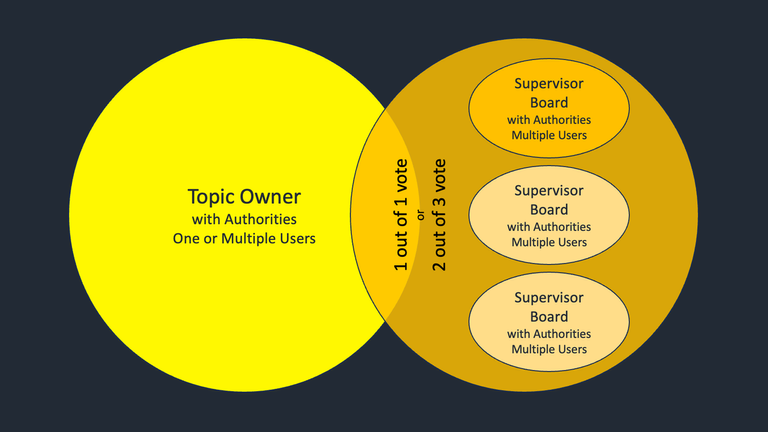For some time I have been thinking about a governance setup that is both practical and decentralised enough for a community to be safe from malpractice and abuse of powers. Various setups can be found in the crypto universe, from direct involvement in decision-making to quite centralised setups.
From my experience, I realise that the theory is mostly true in practice:
the more decentralised the decision-making, the less efficiently the organisation is managed

For sure the topic at hand plays a large role in the level of decentralised voting required. Some decisions are so foundational to the community; Voting on such may need to be at the highest level of decentralisation, ie at the community member level. However other types of decisions may require speed such as (daily) operational decisions. These are for instance deals with external parties, paying bills received, certain developments, hosting, marketing or whatever costs are within the authoritative scope of the community-chosen topic owner.
Effective and Efficient Decentralised Governance
In essence, an individual or team of individuals are elected by the community, per topic and task or multiple thereof. These elected users receive a set of authorities coming with the job. Let's call these users topic owners.
But that is not all...

What we can learn from the Centralised World
In the (centralised) business world in which the daily operational powers are with the board of directors, this board doesn't have the ultimate and unlimited powers. In a standard setup of such a business organisation, a supervisor board exists with special powers. They have the power to take the power away from either a single member of the board of directors up to the whole board itself. While the supervisor board shall not intervene in the direct operations of the company, it shall make sure the board of directors are acting in the - best - interest of all its stakeholders.
In reality - in quite a lot of countries around the globe - the stakeholders are more or less limited to shareholders only. But stakeholders can shall include all other stakeholders in the business, including employees. Stakeholders may even include the village, giving home the employees. But all this is perhaps less relevant for the discussion today. Food for another post 😉
The members of the supervisor board shall work independently from the board of directors without obvious conflict of interest, which isn't always the case in reality.
Supervisor boards in the Decentralised Governance system
Applying the above in communities aiming for decentralisation, we introduce the equivalent of the supervisor board which you can see depicted in the image above, to the right. To add another layer of decentralisation, instead of a single supervisor board, multiple supervisor boards can be installed. Each board executes the same task, supervising the board of directors or as I called them topic owners. Whenever a supervisor board thinks they need to execute their power, the other supervisor boards need to form an opinion. Per board a decision. The majority of these board decisions determine the result.
As already briefly mentioned before, each member given a set of authorities will be elected by the wider community. Periodically, elections are held. Additional elections can be held, when required, for instance when the supervisor board sends one or more topic owners home.
The setup of the governance - one or multiple supervisor boards - will be defined per topic. For instance, a topic owner receiving the authority to onboard new CEX listings will be supervised by three supervisor boards. For instance, the topic owner receiving the authority to spend the day-to-day marketing budgets may be supervised by just a single supervisor board. The community will decide on the setup through direct voting on proposals for the topic including the authorities such topic owner receives and the number of supervisor boards.
To set this whole system up with a one-round community vote, care must be taken in formulating the proposals. If needed a multitude of proposals will need to be put forward. Selectable parameters during a vote would make the voting seemingly more complex. However, this could reduce the number of proposals that need to be formulated for a simple yes/no vote.
At all times, the community keeps the power to send any single member, a set of members or all members of the governance system, home. A majority vote from the community is required for this.
More details need consideration, including but not limited to:
- What authorities a topic owner receives
- Skills of a topic owner and supervisor board member
- Whether subject matter expertise is required
I am not conclusive about the above-mentioned topics. I prefer subject matter expertise, though I like to see appropriate skills as well. Some of those skills could be to bring out the best in peeps and get advice from subject matter experts.
Regarding the topic owner authorities: This will always be very tailor-made to the community. Perhaps the set of authorities for a specific role or topic owner needs to be decided on - with a vote - by the community at large before elections are held to put topic owners and supervisor board members in place.

Election system: Considerations
The election system itself has a few variables that need a decision, with the most important ones being:
- Majority vote based on 50% + 1 or perhaps 60/40, 70/30 or some other ratio?
- Stake, Holding or User-based Voting (or a combination thereof)
- Time till the next elections
ad 1) Although I may be wrong, I think 50%+1 is a good ratio to start with. I believe we can adjust this ratio - through a community vote - whenever this is wanted.
ad 2) I think user-based voting needs to be put in place, even though it is not trivial how to implement such a system. It is true that stake/holding-based voting appeals to the more skin-in-the-game philosophy. It is true when someone has more to lose this can have positive effects. But at the same time, this can result in unwanted effects as well. A few may own the majority stake. Since this can always be the case, now and anytime in the future, such stack/holding-based vote power, isn't the best for governance voting. Therefore I suggest we find a solution to a vote per user with each user vote having the same power.
ad 3) A year is perhaps the most common, however, this period can also be shorter when this makes sense. A balance needs to be sought between the length of an elective period, and the time needed to get fully effective in the role.
Transparency and Tools
An important - perhaps the most important - factor in decentralised governance, is transparency. Usually, in decentralised communities, we see numerous channels in which discussions take place. From Medium - and HIVE - blog posts to more than a handful of Discord servers to a gazillion Telegram channels. For the wider community, it becomes impossible to follow them all.
Therefore for any decentralised governance system, a central spot is required where information is provided and discussions take place. Information can be anything, from ideas, concepts, and plans, to progress reports, achievements and whatnot.
When we want to have active involvement of the wider community - even when only during a voting round - we have to make it easy for the wider community to get to the relevant information.
Am I too Pragmatic?
I realise plenty of members of decentralised communities believe in - almost - absolute power by its members without any central entities. But it isn't very efficient in daily operations. That is why I ended up with the model I described above. To allow for effective and efficient governance whilst sufficient control is put in place to prevent abuse of powers. To be as pragmatic as possible. However, I may have been a bit too pragmatic: You tell me! 😉
Tell me What You Think
Am curious about your thoughts and opinions regarding decentralised governance in general as well as the proposed setup. I love it when you're super critical. Bring me opposing opinions. Am very much interested in your thoughts that lead to such opinions. Let us discuss!






